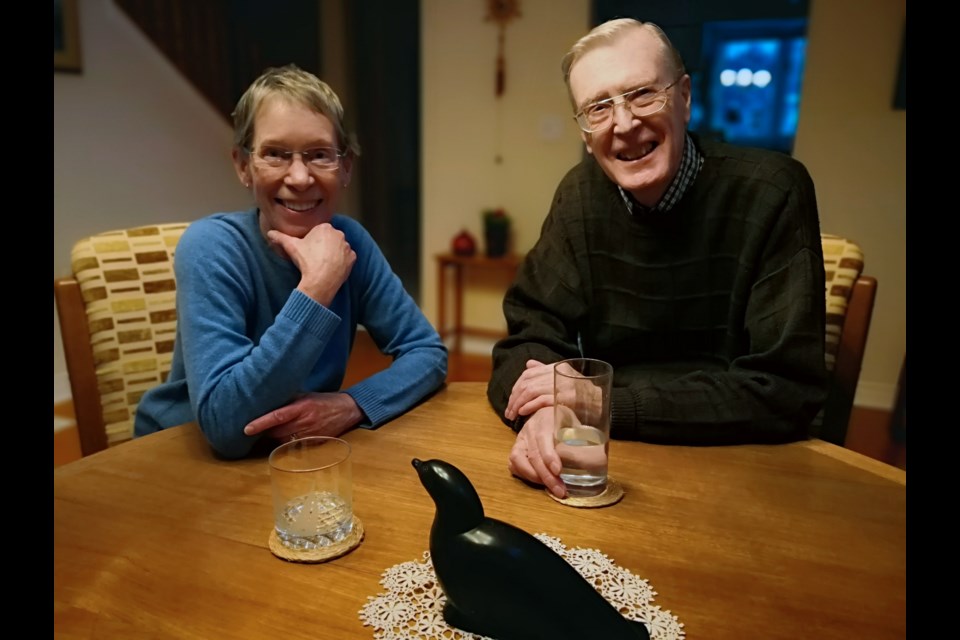A birthday is a milestone on the way to a tombstone.
This is how Alec Adams likes to turn a topic as dark as death into a humorous one.
Adams was introduced to death early.
“I grew up in London during the war, and it was terrifying to grow up with daily air raids,” said the 83-year-old Orillia resident.
“One day, I was coming home from school, in late 1944, and I heard a V-1 bomber coming. I ran a quarter of a mile to get home, down to the air raid shelter in our garden, jumped in and landed spread-eagled on the concrete floor.”
Adams remembers lying on the floor, expecting the bomb to hit at any moment.
“I was quaking with fear,” he said. “I expected to die; I thought I was a goner.”
He lived to see the Allies victorious, but death returned a few years later for his father.
“He'd been a soldier in the First World War,” said Adams of his dad. “He’d become a smoker, and he got lung cancer.”
The doctors couldn’t help.
“He suffered terribly,” said Adams. “He was only 63 and wanted to die. I watched him die, so I had a lot more experience with death and dying than many people my age.”
In 2013, Adams had a major cardiac event, which almost killed him. But he wasn't alarmed by the experience.
At his age, Adams said, he’s philosophical. Statistically, he has about a 50% chance of living to be 90, he says
“The chances are that I'm going to check out in the next few years,” said Adams, adding with a chuckle, “Death is just something that is going to happen. It's inevitable.”
Despite being “ready,” he said, “I'd be a little disappointed if I died next week, but I won't be surprised.”
Unlike his long-time friend, Cheryl Behan, Adams said he doesn’t think about death as a journey to the next world or about an afterlife.
Behan, on the other hand, said she has used her strong faith several times in her life to reconcile the loss of friends and family.
“As a nurse, I saw a lot of death,” said the Orillia resident. “I had to become comfortable with it and help others face it. As I got older, I lost family members: my parents, a sister, and my husband. I had to really face my own feelings and my own philosophy about (death).”
Despite all preparations, the loss of her husband, who chose to end his life through medical assistance in dying, was devastating for Behan.
“He had a progressive neurological disorder, and we had to face it,” said the 73-year-old. “If he hadn't chosen the medically-assisted death, we would have had to face his advancing disease anyway. We knew death was coming closer, so we both had to be comfortable with it on all levels.”
Both of them took a whole year to psychologically prepare for the death. Behan said they had no doubt it was the right decision, but they had to brace for questions from friends and educate themselves about the procedure.
“People said to me, ‘Cheryl, it'll be tough,’” she recalled. “I had no idea it would be as tough as it was — I felt like I had lost my right arm.”
But, Behan said, her husband’s death and illness forced her to think about her own preparation for death.
Having already made a will when she retired, she updated it, and also took a look at how she had lived her life.
“It's good to cover all bases,” said Behan. “If you have anything on your mind, you try to resolve it. That's something one should strive for all the time.”
She says she’s at peace even if death were to knock at her door unexpectedly.
“If I were to suddenly have a stroke or a profound or acute illness, I wouldn't be devastated because I'm quite comfortable where I am in life,” said Behan. “I'm grateful for having had the opportunity to help others, and I feel I've had a satisfying and full life.”
Both Adams and Behan agreed that losing friends and family severs connections that one relies on for support and comfort.
“It takes away a part of you,” said Adams. “It really changes your landscape. I stay in touch with people, and then those people aren't there to talk to.”
Death can be very isolating to surviving family members, said Marnie Bosco, a funeral director at Mundell Funeral Home. She said it’s especially tough when they have to go through technical procedures, such as updating their own wills or naming beneficiaries from insurance benefits.
As well, the journey after the loss involves the surviving family members coming to terms with a new identity, she added.
It’s important to have help on the journey, she said.
“We have staff that specializes in family care,” said Bosco. “They help the surviving members go through paperwork they don't want to think about or may not know needs to be done, such as notifying the different branches of government, pension boards, and applying for death benefits.”
Fellow funeral director and chapel manager, Nicole Johnston, added that the traditional phase of memorialization has changed over the years.
Some unique ways of memorializing a loved one include preparing tokens of remembrance from the person who has passed away, said Johnston. Sometimes the family can give away items the deceased owned.
“None of this is about trying to forget a loved one,” said Johnston. “It's about creating a supportive network around the surviving member(s) so they can heal.”
